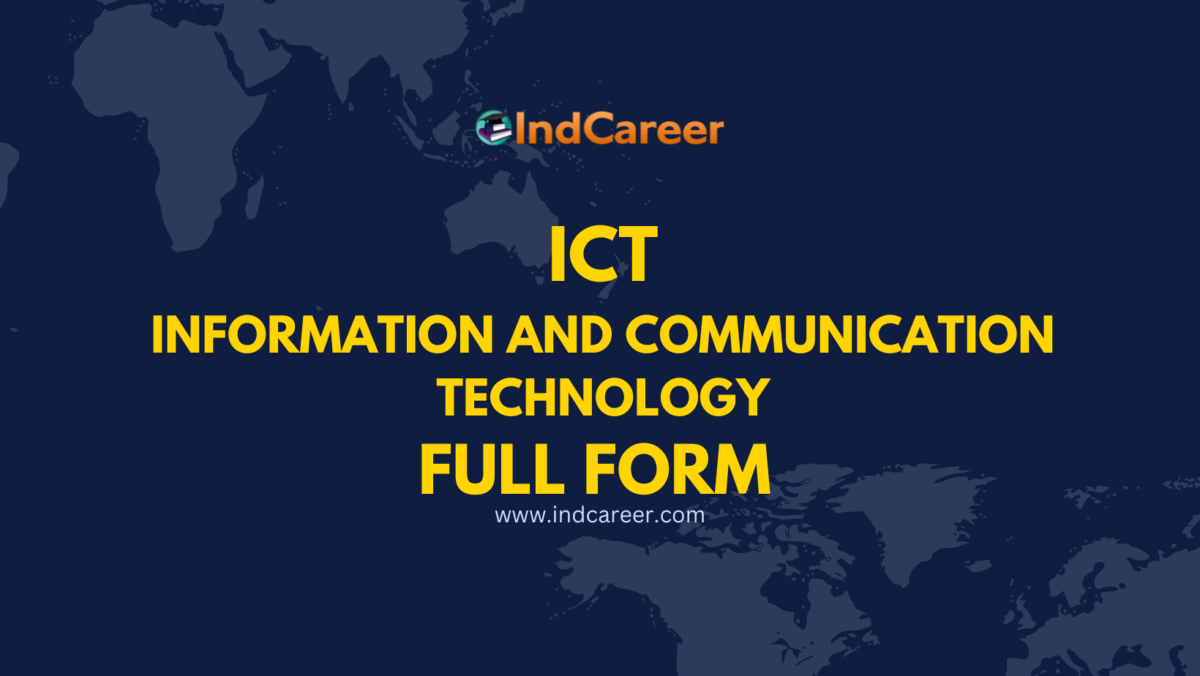Contents
- 1 ICT full form – What is the Full Form of ICT?
- 2 The Evolution of Information and Communication Technology
- 3 Components of ICT
- 4 Importance of ICT in Various Sectors
- 5 How ICT is Transforming Education
- 6 ICT’s Role in Business and Commerce
- 7 Healthcare and ICT: A Vital Connection
- 8 ICT in Government and Governance
- 9 The Impact of ICT on Social Interaction
- 10 ICT and Sustainable Development
- 11 Cybersecurity in the Age of ICT
- 12 Future Trends in ICT
- 13 Challenges and Ethical Considerations in ICT
- 14 Bridging the Digital Divide
- 15 Conclusion
- 16 FAQs
ICT stands for “Information and Communication Technology.” It encompasses a wide range of technologies, tools, and services that facilitate the management, storage, retrieval, and transmission of information. ICT has become an integral part of our interconnected world, driving progress and innovation across various sectors.
ICT full form – What is the Full Form of ICT?
The Evolution of Information and Communication Technology
The roots of ICT can be traced back to the early days of computing and telecommunication. However, the modern concept of ICT emerged with the convergence of computers and communication technologies, leading to the seamless integration of data processing and communication functions.
Components of ICT
Information Technology (IT)
Information Technology refers to the hardware, software, networks, and infrastructure that enable the processing, storage, and manipulation of data. IT forms the backbone of ICT, providing the tools necessary for managing information effectively.
Communication Technology
Communication Technology encompasses various means of transmitting and sharing information. This includes telecommunications networks, the internet, wireless communication, and other technologies that enable real-time interaction and data exchange.
Importance of ICT in Various Sectors
ICT plays a pivotal role in sectors such as education, business, healthcare, governance, and social interactions. It has revolutionized the way we access information, communicate, conduct transactions, and carry out day-to-day activities.
How ICT is Transforming Education
ICT has transformed the traditional classroom into a dynamic, digitally enhanced learning environment. Interactive online platforms, e-learning tools, and digital resources enable personalized and remote learning opportunities.
ICT’s Role in Business and Commerce
Businesses leverage ICT for efficient data management, communication, marketing, and e-commerce. Cloud computing, digital payment systems, and online marketplaces have reshaped the business landscape.
Healthcare and ICT: A Vital Connection
ICT has improved healthcare services through electronic health records, telemedicine, medical imaging, and remote patient monitoring. These technologies enhance patient care, diagnosis, and treatment.
ICT in Government and Governance
Governments use ICT for e-governance, digital public services, and data-driven decision-making. It enhances transparency, public participation, and service delivery.
The Impact of ICT on Social Interaction
ICT has transformed how we connect and communicate, enabling instant global communication through social media, messaging apps, and video conferencing. It has reshaped social interactions and networking.
ICT and Sustainable Development
ICT plays a crucial role in achieving sustainable development goals by enabling access to information, promoting digital literacy, and supporting initiatives in areas such as agriculture, environment, and disaster management.
Cybersecurity in the Age of ICT
As reliance on ICT grows, so does the importance of cybersecurity. Protecting sensitive data, preventing cyber threats, and ensuring privacy have become critical concerns.
Future Trends in ICT
The future of ICT holds exciting possibilities, including 5G networks, Internet of Things (IoT) advancements, artificial intelligence integration, and immersive technologies like virtual and augmented reality.
Challenges and Ethical Considerations in ICT
The rapid pace of technological advancement raises ethical questions related to data privacy, surveillance, and digital divide. Striking a balance between innovation and ethical principles is a pressing challenge.
Bridging the Digital Divide
While ICT has brought numerous benefits, the digital divide still exists, with unequal access to technology and information. Efforts are needed to ensure equitable access and digital literacy for all.
Conclusion
In conclusion, Information and Communication Technology (ICT) has become a cornerstone of modern society, influencing how we learn, work, communicate, and interact. Its multifaceted impact spans across sectors and has the potential to drive positive change and innovation. As we navigate the evolving digital landscape, understanding and harnessing the power of ICT will continue to be essential for progress.
FAQs
While ICT includes Information Technology (IT), it goes beyond by encompassing communication technologies and their integration for information sharing.
ICT has streamlined business processes, facilitated online transactions, and enabled global reach through digital marketing and e-commerce platforms.
ICT has revolutionized education with online learning platforms, interactive tools, and digital resources that enhance teaching and learning experiences.
Telemedicine, where patients can consult with doctors remotely through video calls, is a prime example of how ICT is transforming healthcare.
The future of ICT holds exciting advancements such as faster and more connected networks, increased integration of AI, and innovations in immersive technologies like virtual reality.
